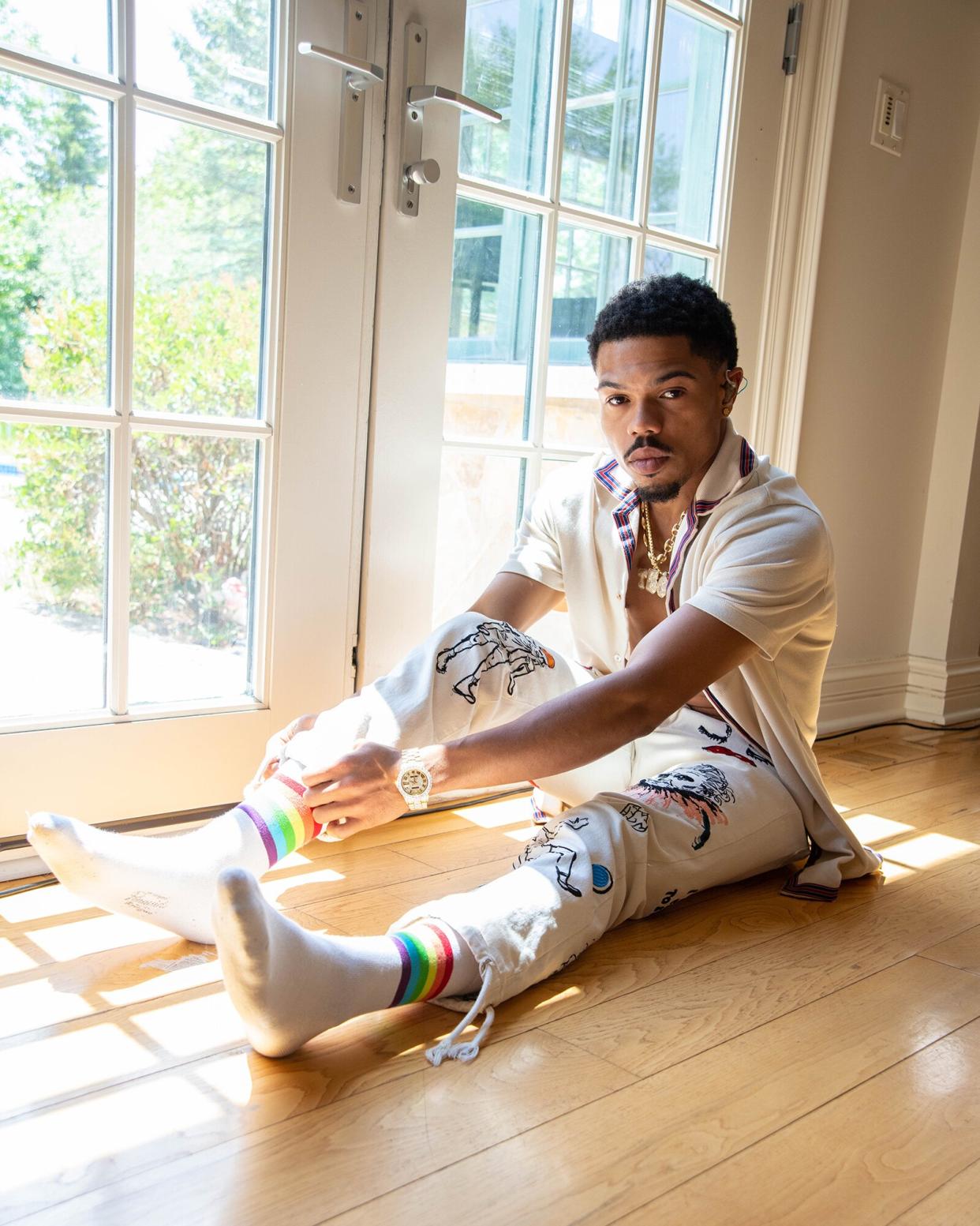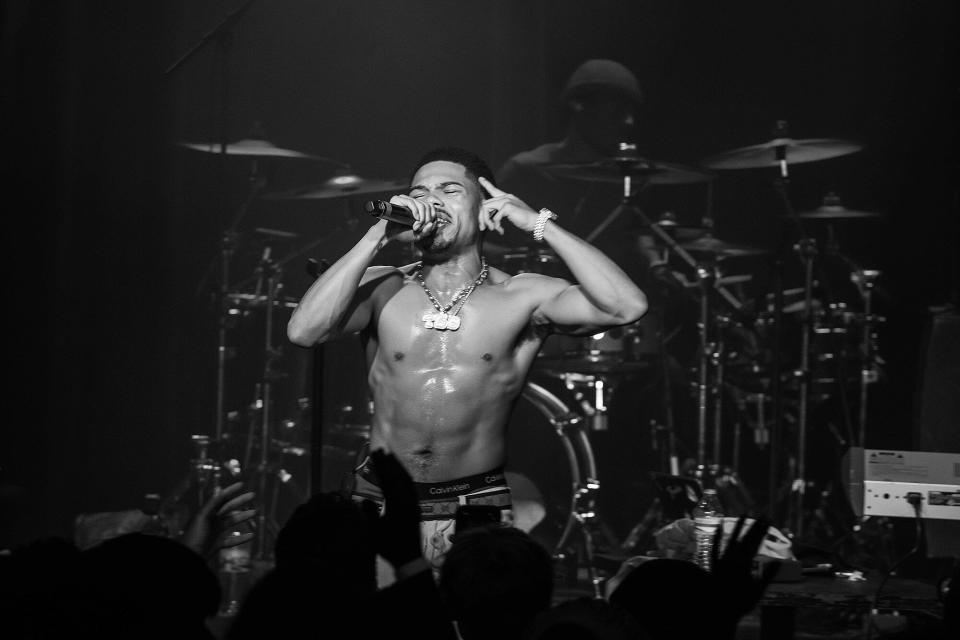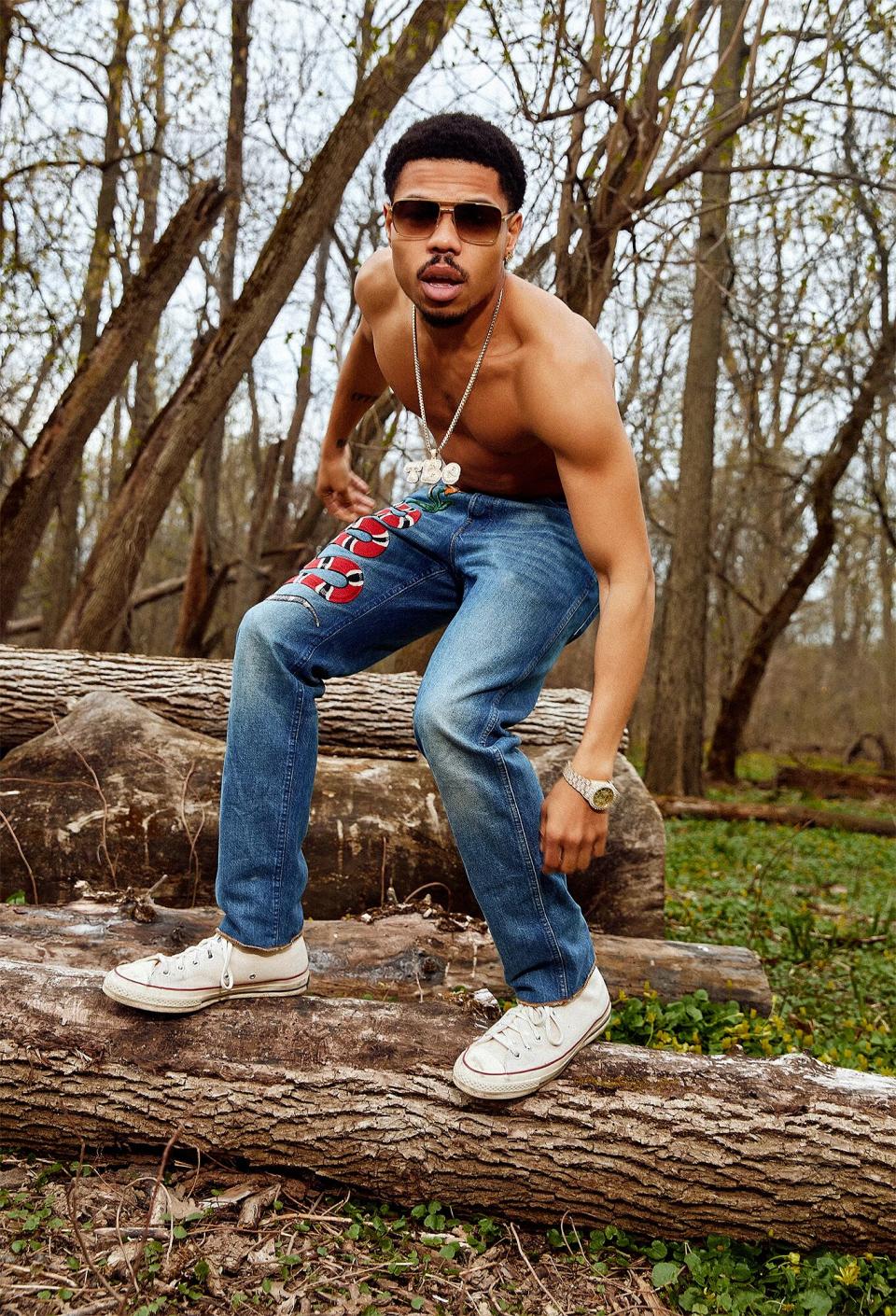Rapper Taylor Bennett Reveals 'I've Never Been Happier' 5 Years After Coming Out as Bisexual

Courtesy of Taylor Bennett/Shore Fire Media Taylor Bennett
Taylor Bennett is living his best life.
Hot off the April release of his latest album Coming of Age, the rapper, 26, headlined NYC's Youth Pride celebration in Central Park last month. And next week, he'll hit the stage in his native Chicago for a free Homecoming show. (Check out his Be Yourself, Be a Champion tour dates here.)
Bennett, who is Chance the Rapper's younger brother, came out as bisexual in 2017. In the years since, he's become a vocal LGBTQ advocate — and also a father, welcoming sons Charlie, 3, and Blake, 2, with partner Kayla Moore.
PEOPLE recently caught up with Bennett about life as a queer hip-hop artist, fatherhood and working with family.

Courtesy of Taylor Bennett/Shore Fire Media Taylor Bennett
You just performed at NYC Youth Pride. Why is it important to you to align yourself with events like that?
Spaces like this, I didn't have that as a kid, and if I felt more support as a child — and I also believe this for a lot of other folks that I know — we probably would be more content with who we are. I think a lot of times it's the outside opinion of others that I know, especially for me, kept me in the closet. So having these performances, even for people that aren't a part of the LGBTQ, it's an open conversation and a chance to experience and learn more about a community that we should all be talking about a lot more. When I get to do things that I feel I wish I had for myself, that's bigger than everything.
Before I came out, I had been going to Chicago Pride since I was 16. A lot of kids, no matter if you belong in the community or not, it's a huge thing. Having the opportunity where you can bring others, that might not be a part of that community that do hear about the community in a negative way, being able to bring them and have them experience that is such a big deal. And there's some things that people just a conversation isn't enough; you actually have to literally interact with this community.
You came out as bisexual five years ago. Tell me about your journey when it comes to your sexuality.
I had always known, and it was always a thing for me, even at a younger age, but it was definitely something that not only did I not feel confident talking about. When I was growing up, it was always presented as being gay or being a part of the LGBTQ community was an option — so it was like, "Oh no, you're not gay [or bi], you just need to toughen up."

Courtesy of Taylor Bennett/Shore Fire Media Taylor Bennett
I'll never forget, in sixth grade, a friend came out and said he was gay. He was the first kid, not just in our grade but in the whole school, that I ever remember, saying "I'm gay." It was a big thing. And I'll never forget that another good friend called him a f-----. I was so upset with him. And I remember saying if you can't accept this kid for who he is, then we can't be friends. I'll never forget it, and I think it was such a big moment because when I did come out, I remember he even texted me and he was like, "We got to talk about this." And I was like, "Let's talk about it." I know that he remembers that [middle school conversation], and I know that he probably thinks about it at this point and is like, "Wow, I wouldn't say that to my best friend."
There aren't that many queer people in hip-hop. What was your experience like after you came out?
There was so much love, and I've never really felt like I was isolated. Also, sometimes I don't realize how strong the words that I might say can be — your words actually start to touch people and they start to move them and change the perception.
[Since coming out], these have been the best years of my life. I've never been happier than now. I've never felt more confident in myself. I've never wanted to do more. I've never felt that I could do more. I've never felt more represented. And not just by myself, but by other people. So it feels good to be on the team you want to be on. It's okay to be in the bleachers and to be supportive. But if you know you're really that athlete that's supposed to be shooting that shot, watching him do it just feels different. And then once you do it and you realize that you can make that shot, it changes the whole game and how you think about it, because then it's not just about that one basket, but how do we win the game?
You work closely with your brother Chance and your dad. Why does that work — and what are the challenges that come with a family business in music?
I would say the reason why it works is growing up, discipline was a big thing with my dad. We had weekly and weekend chores. So chance used to have to sweep him up the floors and I used to have to do the bathrooms on the weekends, but the dishes and the tables in the kitchen on the weekdays. If you didn't do what you were supposed to do during the week, instead of $10, you got $5, which meant that you couldn't get the slice of pizza and drink when you get on the train after school. We were taught accountability at a very young age.
[Years later], when my brother was looking for management, he was looking at the things I was doing [with my career]. He said that he wanted me to come on and he wanted me to help him. And I was like, "Chance, I think that we need to ask my dad to come in and help do the senior advisory for the team." We never have emotions in anything, really — my father or my brother or me — when it comes to business, because we were always taught from a very young age: "I don't care if you're upset. I don't care if you get into it with your brother. If I get back and these floors aren't swept and it's not cleaned, you're not going to get your allowance." So it's a thing where we were taught at a young age that if you want something then you have to do something for it and that we shouldn't let the emotions affect the business of where we're all trying to get to.
I think my father, a lot of times, finds himself in the dad position where he's like, "Well, you're both my sons and I love you and you're both right, but really this is right."
Your kids are getting to an age where they're really showing their personalities now. What's the last thing they did that made you laugh?
Charlie is so kind, and — no offense to Chance; Chance is an amazing big brother — he is such a good big brother. They're both very determined, which reminds me of my brother and I. So if they want something, they're going to figure out how to get it. A lot of times, they know now it's not just with crying, sometimes it's with accepting what we say and then literally sneaking into the other room, and I come back and I'm like, "Wait a minute, how did all of these Oreos get on the floor?" So [Charlie] is a mastermind, and I love him so much.
also what I do appreciate the most from both of my boys — I believe they listen to me. Charlie's 3 now, and I've been talking to Charlie for a year and a half, ever since he's been in his speech classes; and I'll really talk to him. He'll be having a whole tantrum and I'll be like, "Char, what's going on? What do you want buddy?" And he'll say, "I want the mac and cheese." It's a thing where sometimes as a kid, you know you're having this tantrum and you're going crazy and you're like, "This is what I want." But we haven't been taught to express ourselves in the way. So that's how we're expressing ourselves.

 Yahoo News
Yahoo News 
